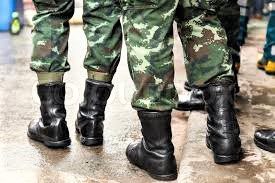It was meant to be a kind gesture but a decision by President Mokgweetsi Masisi to review and adjust salaries for security sector workers is back to haunt his administration ahead of polls set for October.
After gambling on adjusting the salaries of members of the Botswana Defence Force, Botswana Police Service and Botswana Prisons Services ahead of the October polls, Masisi now faces the disturbing consequences of what is perceived to be his divide and rule tactics by public service unions.
The government is of the view that the salary adjustments are irrelevant to ongoing negotiations between employer and trade unions as forces are not governed by the Public Service Act which regulates the civil service.
On the other hand, the six civil service unions are of the view that the government does not want to align the salary adjustment for their members with those recently awarded to the disciplined forces.
The unions are threatening to embark on a nationwide strike if the government does not give in to their demands.
“The negotiations have been on-going continuously but with very little progress on critical areas of interest…parties could not find a common ground on a fundamental matter of closing the gap between the public employees’ current pay and what the market is currently paying and also of addressing the injustice and discrimination within the public service salary structure occasioned by adjustments made to the salaries of the disciplined forces,” said Tobokani Rari who is coordinating the negotiations on behalf of six public service unions.
He added: “The union party had proposed that in line with the dispensation that was extended to the disciplined forces, the value of A3 salary band should be improved to that of A2 salary band which will have a ripple effect on the rest of the salary scales/bands in the public service.
Without ruling out the possibility of an industrial action, Rari said they would consult their members on the way forward.
Rari added that the government “is back at its old and outdated tactics of fighting trade unions by attempting to put trade union leaders and their members on a collision course.”
“This has failed the past and we warn the employer and government in general that such a tactic will still not pass the taste time,” he said.
The director of Public Service Management, Goitseone Mosalakatane said the unions were to blame for failing to reach an agreement on improving conditions of service for the public service.
She said the unions “indicated that they will not agree to anything unless all public officers are moved up by one grade in line with what was done for disciplined forces.”
She said the employer clarified to unions that the disciplined forces are rank based, with an emphasis on command and control.
“Therefore owing to structural discrepancies for the BDF, the police and prisons, a decision was taken to delink these structures in order to cater for the rank based command and control principle within their cadres,” said Mosalakatane.
While Masisi did not give details on the scale of the increase for the security service sector, his decision allegedly raises eyebrows, given the timing of the upwards review and the fact that the percentage increase is not uniform for all civil servants.
But University of Botswana academic Gladys Mokhawa does not think so.
“I genuinely don’t think the increase of pay for the security service sector raises any eyebrows. But, obviously with the political sensitivities that have bedevilled the country since the assumption of office by President Masisi eyebrows will be raised,” she said.
KO/jn/APA


